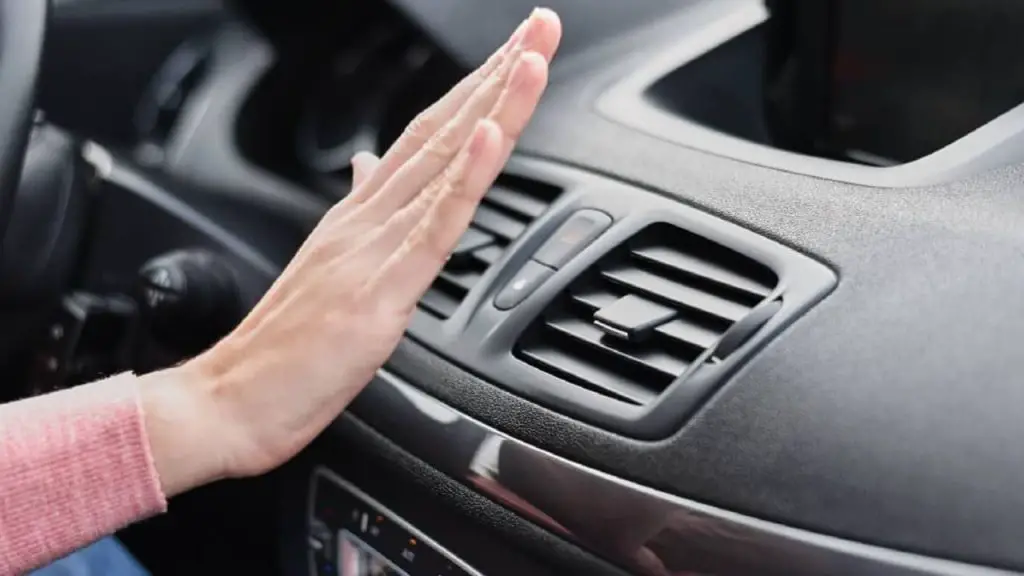Summertime is in full swing, and that means one thing for many people: cranking up the AC! Air conditioning is a staple in homes and cars across the country, but how does it work? And does it use gas?
In this article, we will discuss does ac use gas? Following this, we will look at how an AC works. We will shed some light on other topics like how much gas is used?
Would it make a difference if we didn’t use AC? And, How can we improve fuel economy? Stay cool!
So, does ac use gas? Yes, but not significantly enough to matter, according to the manager of repair systems for the American Automobile Association (AAA).
When running, the AC system adds a little burden to the engine, which might cause it to use more gas. This usage would go unnoticed by most people.
How Does an AC Work?

To begin, let’s look at how air conditioners function to understand why they might need gas in the first place.
Car air conditioning cools and operates on the same principles as home AC, but the major distinction is that it requires power from the engine.
1. Refrigerant
Evaporation is the mechanism by which refrigerants function. When a liquid evaporates, it removes heat. It’s similar to sweating while gardening on a hot day.
It’s not the sweat that cools you down; it’s the evaporation of your head that removes the heat.
The coolant in your car, truck, or van is the same as that in an air conditioner. It’s changed by draining and refilling. The system transforms compressed refrigerant into a less dense gas and removes heat during the swap.
2. Compressor
An air compressor is basically a portable compressor that fills a steel container with pressurized air. A vehicle AC compressor works in the same manner as an ordinary AC compressor, only it compresses refrigerant instead of air.
The accessory belt on the engine drives a pulley on the compressor, which draws in the heated refrigerant.
3. Condenser
The condenser is a heat exchanger like a radiator. The condenser cools the compressed gas until it becomes a liquid, similar to a radiator. To keep you cool, this cold liquid must be reintroduced into the cabin.
4. Expansion Tube
The expansion tube, sometimes known as an “expansion valve,” or simply a “fixed-orifice tube,” controls the flow of refrigerant.
When there is too much supercold liquid in the evaporator, it will freeze up; when there isn’t enough, your AC won’t provide anything chilly at all. The expansion tube allows just the correct quantity of refrigerant based on your AC settings.
5. Receiver
The receiver, often known as the “AC drier,” is a filter and temporary storage.
Water can harm the compressor if it comes into contact with it; therefore, any water or debris is removed by the filtering.
6. Evaporator
The evaporator is where the AC system’s secret lies. A fan rotates and blows cool air into the cabin through a blower motor.
The heat from the heated air as it contacts the cold refrigerant in the evaporator is converted to a low-pressure gas, which is then carried away by way of the condenser after leaving the evaporator and heading back to the compressor.
As a result, you get nice cooled air emanating from your AC vents.
AC On vs. AC Off: Is There a Difference?
We do have a general idea of how much AC consumption costs you in gas usage, thanks to the fact that there are several factors such as ambient air temperature, shade or sun parking, and the degree of tint on your windows.
Oak Ridge Lab conducted scientific evaluations and collected interesting data by scientifically controlling variables and measuring outcomes on their Ford Explorer and Toyota Corolla.
At 100% AC on, the Ford Explorer consumed 55% more gasoline at idle, 27% more fuel at 40 mph, and just 14% more fuel at 70 mph in the lab.
The Corolla provided similar figures, with a large 60 percent increase in fuel use at idle, a 22 percent increase above 40 MPH, and only a 9 percent rise past 70.
The short version: At idle, rolling down the windows is less expensive but won’t show up in your fuel use calculations.
Fuel Economy: Tips to Improve
Forget about the AC if you want to improve your miles per gallon (MPG). Look somewhere else. AAA has a wealth of information on its website, but here are a few tips to consider.
- Tire pressure: When it comes to gas mileage, having improperly inflated tires have a greater influence than whether or not the AC is used. Underinflated tires create more rolling resistance than overinflated ones, although overinflated tires are less of a problem, which lowers fuel efficiency.
- Drive conservatively. The most efficient way to apply the brakes is at a moderate speed and with constant pressure. AAA says that hard braking, for example, can reduce fuel efficiency by 15 to 30 percent at highway speeds and 10 to 40 percent in stop-and-go traffic.
- Avoid excessive idling. If you’ll be stopped for a long period of time and it’s safe to do so, switch off your engine. An idling motor uses roughly a quarter to one-half of petrol each hour.
- Proper vehicle maintenance: Consumers should follow the manufacturer’s recommended service schedule to increase fuel efficiency.
Conclusion
So does AC use gas? We have seen that it does, but there are ways to improve fuel economy. Ultimately, it is up to the driver to make the best decisions for their vehicle. Furthermore, we have looked at how an AC works and how it cools the air in your car. Plus, we got an idea of how much gas will be used when the car’s AC is o and off on a journey.
FAQs
Does AC spend fuel?
As we can see, it does use more fuel when the AC is on; however, there are many other things that affect fuel economy.
For instance, how you drive, what state your vehicle is in, and other stuff like that.
What are some ways to improve fuel economy?
There are a few ways to improve fuel economy, and they mostly have to do with how you drive and take care of your car.
Also, properly maintaining your vehicle, checking tires, and driving properly can help you in improving the fuel economy.
Additional Contents



